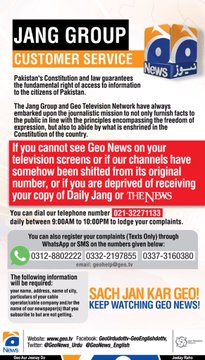Frud Bezhan
Pakistani media outlets and journalists often face consequences for refusing to toe the line of the country’s all-powerful military.
The Pakistani military and its notorious intelligence services have long been accused of stifling the independent media and silencing opposition through intimidation, censorship, and even assassination.
Now observers say Pakistan’s popular Geo TV is being punished for its tug-of-war with the military. Geo TV, part of Pakistan's largest commercial media group, Jang, was taken off the air in many parts of the country on April 1, with media watchdogs and journalists claiming foul play.
The Pakistan Electronic Media Regulatory Authority (PERMA) and the Islamabad government have insisted they were not behind the suspension of the channel. Interior Minister Ahsan Iqbal said he launched an investigation on April 3, but the perpetrators have still not been found or named.
With no claim of responsibility, many suspect the military, which has an oversized role in domestic and foreign affairs in the South Asian country.
"There’s no doubt that the military is behind the blackout," says Ayesha Siddiqa, a Pakistani military analyst and author.
Last month, Army Chief General Qamar Javed Bajwa held an off-the-record briefing with a group of journalists in Rawalpindi that was widely reported. Bajwa described Geo TV as "subversive" and warned the channel that it would face consequences for crossing "red lines" by challenging the military, several reporters with knowledge about what was discussed during the briefing told RFE/RL. The military has rejected this account of events.
"The military doesn’t want any channel to report about anything that is against [its] interests, certainly not in its ongoing political battle," says Siddiqa. "Geo TV is one of the few Pakistani media outlets that are ready to provide an alternative perspective."
The Pakistani military did not respond to a request for comment.
Tug-Of-War
Geo TV and the military have been at odds since 2014, when Geo TV anchor and journalist Hamid Mir was shot in the port city of Karachi. Mir accused the military’s Inter-Services Intelligence (ISI) spy agency of ordering the assassination attempt. Geo TV publicly backed Mir’s claims, while the military denied any involvement.
Recently, Geo TV has refused to follow the military's line on the corruption case against ousted Prime Minister Nawaz Sharif, who is embroiled in an ongoing war of words with the military. The Supreme Court in July 2017 disqualified Sharif from office due to corruption charges, which he has refuted. Sharif blamed "hidden hands" for his ousting, an apparent reference to the military.
Allies of the three-time prime minister, who was toppled in a military coup in 1999, have called the case a political vendetta and suggested the military might be behind it.
Pakistani journalists say Geo TV has been of the few outlets in Pakistan that has reported independently on the corruption case and given the side of the Sharif family.
"The establishment wants to scuttle any dissent covered by the media, especially to prevent the voice of Nawaz Sharif from reaching the public," says Marvi Sirmed, an Islamabad-based journalist and human rights activist. "It is important ahead of elections in order to get the public opinion manipulated through other, more obedient media outlets."
Geo TV anchors and senior journalists have also taken a stance against the rolling back of the 18th amendment, which in 2010 decentralized power in Pakistan and brought about a parliamentary system, reversing many changes made by military rulers to the constitution over the last few decades.
"This is not just about Nawaz Sharif, but also about dissent over rolling back the 18th amendment, too," says Sirmed, who claims the military wants to roll back the constitutional amendment "because it is affecting the establishment’s ability to manipulate policy" and its "control on resources."
Bajwa, in his off-the-record briefing with journalists, was quoted widely as saying that the 18th amendment was "more dangerous than Sheikh Mujibur Rehman’s six points."
Rehman was the founding father of Bangladesh, which gained independence from Pakistan after a devastating war in 1971. His six points were a demand for greater autonomy five years before the Bengali war of independence erupted.
The Pakistani military has said Bajwa's comments were taken out of context and that the military was not opposed to the 18th amendment.
‘Too Frightened’
Geo TV’s suspension has outraged many Pakistani journalists and media activists who have called it a blatant suppression of press freedom.
Pakistani columnist and analyst Imtiaz Alam has called the suspension of Geo TV an example of "blatant suppression of freedom of press and freedom of expression and people’s right to know."
"Time and again it has been proven that a ban is counterproductive, whether it [is] on a party, person, or on media," Pakistani journalist Mazhar Abbas tweeted on April 1. "Yet we have a habit of repeating the same mistakes time and again..."
A statement on Geo TV's website says that "Pakistan's constitution and law[s] guarantee the fundamental right of access to information to the citizens of Pakistan."
"The arbitrary suspension of Geo TV on cable TV is a direct assault on Pakistan's constitutionally guaranteed right to access information," says Steven Butler, the Asia program coordinator at the Committee To Protect Journalists. "It's outrageous that authorities are either unable to find or too frightened to name those powerful enough to orchestrate the blocking of news distribution."




No comments:
Post a Comment